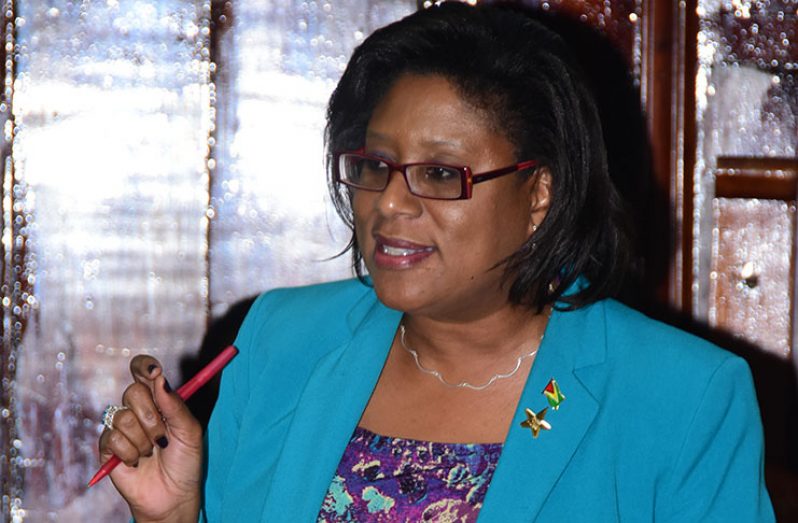SOME 55 ICT Community Hubs are in operation mainly in the coastal regions including Liverpool, Corentyne; Lima Sands and Good Hope, Essequibo Coast, Minister of Public Telecommunications Cathy Hughes said in a message to mark World Telecommunications Day, to be celebrated today.
Hughes said too that community leaders are being trained so they could help others, especially students, who need the internet for class assignments. Simultaneously, the computer labs, staff rooms and administrative offices in 102 secondary schools and technical/vocational institutes now have access to free internet, as do a few regional administration and education offices, hospitals and some public services in the regions.
Below is the full text of the message
World Telecommunication Day has been celebrated annually on 17 May since 1969, the year of the founding of the International Telecommunications Union (ITU). The theme this year, “Big Data, Big Impact”, is premised on the fact that every business, governing agency, NGOs, every person and educational institution has access to copious amounts of structured and unstructured data every second of every day. The ITU used this occasion to highlight the numerous means of extracting meaningful value from the data available to us via any ICT device and system at our disposal. Their message is to encourage the use of advanced technologies to manage and store data.
The theme is in keeping with the ITU’s push for technological development in all member countries, including Guyana. From our perspective, development translates into a fully green economy, Smart City and towns, inter-connected public services, e.g. medical facilities, fire, water and electricity services; eLearning, telemedicine and eTransactions. It translates into interconnected primary and secondary schools and university campuses to share lectures in real-time, and research data among other things. It provides information on the safe transfer to computers of the copious amounts of ancient, fragile paper documents currently housed in our national archives, post offices, the Deeds Registry, hospitals and even churches.
The Significant Impact of this technological age for Guyana is the sprint we’re running to take computers, the internet and the wide world of possibilities to our people, including the remote regions where our indigenous citizens live with time-honoured cultures, customs and conventions. This sprint is to ensure that these citizens in particular, can communicate at any time with any one, any authority, any institution in or outside of Guyana; that they have better-than-adequate learning and health facilities.
The Government of Guyana, fully aware of the transformational impact of ICT on national development, established the Ministry of Public Telecommunications in 2016. As part our overall mandate, our achievements to date include the following:
* The passing of the Telecommunications Liberalization Bill that would remove exclusivity from one company
* Drafting the regulations to open up this sector to investors (these have been circulated and stakeholder/public inputs received)
* Providing schools, community centres, Government ministries and public service departments with fast internet
* Designing/facilitating the creation of applications to ultimately eliminate long lines and long hours at the GRA, the Immigration Department, NIS, post offices and even hospitals
* Refining the passport application app, while a broad programme is set in motion to upgrade and convert inland district post offices to ICT Community Hubs with postal services
* Designing an application for safer pension payments
To date, there are 55 ICT Community Hubs in operation mainly in the coastal regions including Liverpool, Corentyne; Lima Sands and Good Hope, Essequibo Coast. Community leaders are being trained so they could help others, especially students who need the internet for class assignments. Simultaneously, the computer labs, staff rooms and administrative offices in 102 secondary schools and technical/vocational institutes now have access to free internet as do a few regional administration and education offices, hospitals and some public services in the regions.
In mid-April, the MOPT signed a Memorandum of Understanding with the University of Guyana to continue our technical collaboration that began in 2016. UG now has a new teleconferencing platform that allows students at the Tain and John’s campuses to participate in live classes at Turkeyen. The first set of Wifi hotspots will also be activated at Turkeyen and CPCE shortly.
The UG campus is also home to our Centre of Excellence in Information Technology (CEIT) which will open its doors in Q3 2017. In collaboration with the Government of India, CEIT will first train Guyanese ICT trainers, since it is imperative that Guyana has its own large pool of highly accomplished ICT skills to service the business community, and to implement and sustain Guyana’s ICT-led education, health, trade and national development.
The Government of Guyana is committed to ensuring that ICT provides modern, cutting-edge support to all productive and social sectors, as well as the enabling environment for a strong, sustainable private sector. The imminent oil and gas industry will also demand that ICT and connectivity become critical elements of our economy. I wish to assure all of our stakeholders and communities that the Ministry of Public Telecommunications is open to working with you, developing new ideas that will utilize ICT to take this nation to the heights it has the potential to reach.




.png)









